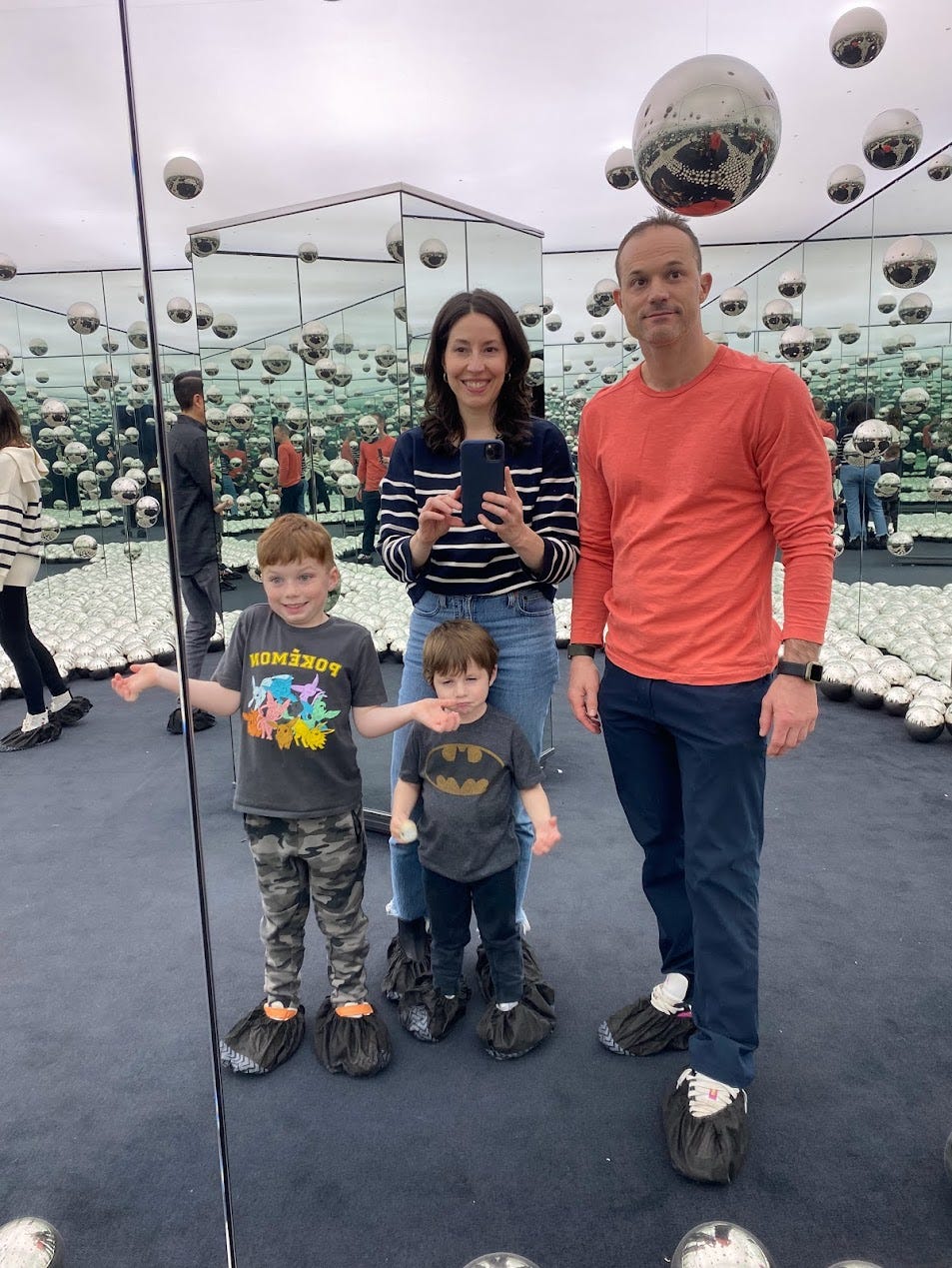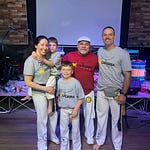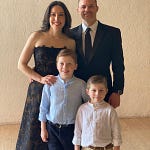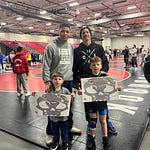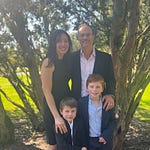🔥Welcome to Volume #00110!🔥
I’m Christian Champ. This is ☯️The Middle Way Newsletter ☯️. It is a place where I write, explore, share, and invite you along for the journey.
If you enjoy the newsletter, please share it with your friends.
🕹️The Best We Can Do Is to Control What We Can Control 🕹️
BAM!!
As the sound boomed out, I lost the ability to peddle.
Did my tire explode?
I glanced at the two skateboards on the front rack, and they were fine.
“Ahhhhhh,” followed a mili-second later in a piercing scream from my son Alex.
Instead of a blown-out tire, it was worse... much worse.
I glanced back to see my younger son statue-like with his jaw on the ground.
My older son held his heel in his hands after pulling his mangled skin out from between the bike wheel.
His shoe sat behind us, about 30 feet away.
We cruised at 20 mph when he managed to jam his foot into the bike wheel while sitting on the bench.
At that moment, the chaos felt extreme.
I took a deep breath and tried to remember we can only control what we can control.
I wanted to shake my son, asking how the heck he let his heel enter the wheel, why he dangled it out there to get burnt by the fire.
Instead, I remembered my breath and ran a quick decision tree.
What was the next best course of action?
I can only control what we do next.
The heel looked terrible, but there wasn’t that much blood. I can call an ambulance, but is that necessary, and how long will it take?
The next best idea was to see if my wife could meet us. I called her, but she didn’t answer.
The bike, while down a spoke and cracked a bit on the wheel’s rim, appeared amply ridable.
We were about fifteen minutes from home, a twenty-five-minute bike ride to the ER at Lurie’s Children’s Hospital, and fifteen minutes from another ER.
Given the extent of the damage remained unknown, I went with the bike ride to Lurie’s, maximizing the available help. If we need an ortho for a torn Achilles or some messed up tendons, the children’s hospital provides the best options.
We flew down the bike lanes while my son tried to hold his body together. He kept his hands holding his heel together for the entire ride to the ER.
My son kept letting me know his pain and fear while blood accumulated on his hands and clothes. The 4-year-old said little, sitting there stoically as we raced ahead.
Over 40 stitches later, everything worked out as well as hoped. There were no tendons or Achilles injuries. He had a nasty gash that got sowed shut.
While bloodier and with more follow-through, the incident represents the challenges we always face. Our options involve trade-offs, the outcomes run the spectrum, and all we can do is make the best choice at that moment.
We take in the information and make a call. Once we make the call, we need to keep going. We can do an after-action review, which helps us with future decisions, but we can’t change the past.
When the emergency bells ring, it focuses us on the matter at hand. Every day, we face a similar challenge as our limited time in life drains away. We don’t see our children bleeding out, but the drip of life continues, and one day it ends.
That is why we always need to control what we can control to drive the best outcomes.
🧠Things to Think About🧠
What the World Needs Now is Discernment by Carol Samford
Carol breaks down one of the most important things we need more of in the world, which is discernment. Clear thinking becomes increasingly important in a world with rampant information and growing complexity.
Discernment, in my experience, is the ability to perceive, understand, and judge things clearly, especially those that are not obvious or straightforward. Discernment, in wisdom traditions, points to a reference for higher morality and effects; getting as close to an ethical perfect or universal answer as can be ascertained. References sources like the Sermon on the Mount in Christian traditions. Or The Four Noble Truths in Buddhism. The Five Pillars of Islam.
When we do it right, we realize what matters.
True discernment means not only distinguishing the right from the wrong; it means distinguishing the primary from the secondary, the essential from the indifferent, the timeless from the urgent, and the permanent from the transient. And, yes, it means distinguishing between the good and bad or the better, and even between the better and the best. We are often called in to make these choices on small and large subjects, and we fail to assess the quality of our thinking, choices, and effects.
What is the Value of Discernment? How does this discernment affect the way we live?
Discernment acts as a prime instrument of regeneration. It calls for grace and humility when engaging living systems including other humans and consideration for their essence process. I have known a small number of people whose ability to ascertain the aims and aspirations of others has been remarkable.
Specifically, discernment catalyzes unitive energy development: One with a whole and see self as embedded in it. Why? Because the discerning person goes to the heart of the matter to understand it.
The wisdom sages have a way of showing us how this works in living systems, and how we can do this for ourselves. Not just one thing having an impact on another thing. The levels are not equal in importance, effectiveness, or power of transformation. They are not all the same but are at different levels of affect and effects. People are not taught to see levels unless they are artificial ones like power structures. We only learn about categories. We see children and families as different categories. Not the nested levels of ordering. Of meaning, significance, leverage, or more impactful.
Byron Wien’s 20 Life Lessons
Byron passed away last week at age 90. He wrote a highly anticipated annual list of ten surprises since 1986.
My favorites from his list:
If you want to be successful and live a long, stimulating life, keep yourself at risk intellectually all the time.
When you meet someone new, treat that person as a friend. Assume he or she is a winner and will become a positive force in your life.
Read all the time. Don’t just do it because you’re curious about something, read actively. Have a point of view before you start a book or article and see if what you think is confirmed or refuted by the author. If you do that, you will read faster and comprehend more.
Get enough sleep.
Evolve. Try to think of your life in phases so you can avoid a burn-out. Do the numbers crunching in the early phase of your career. Try developing concepts later on. Stay at risk throughout the process.
Don’t try to be better than your competitors, try to be different
There is a perfect job out there for everyone. Most people never find it. Keep looking.
Every year, try doing something you have never done before that is totally out of your comfort zone
Martin Gurri on a World Without Babies
One of the biggest changes we are set to see is watching populations decline. The replacement rate is 2.2, and we are not getting that level of children anywhere in the World right now, minus Africa.
How does society respond to a declining population?
People stopped having children when life has gotten good. Switzerland is possibly the wealthiest nation on Earth, with a high-trust, homogeneous population ranked near the top of the happiness index. There are no obvious material or psychological barriers to reproduction, but the Swiss birth rate, at 1.5 children per woman, falls short of the 2.1 needed to replenish the country’s human stock. Italy has the third-largest economy in the European Union as well as a sunny climate and delightful lifeways. Yet Italy is a leader in the global depopulation race—by 2050, 6 million fewer Italians will be enjoying that magnificent weather. Japan, another rich, tightly knit society, may lose 20 million inhabitants by 2050—that’s 45 times the lives lost in Hiroshima and Nagasaki, wiped out in one generation.
🎧Things to Listen, See, and Watch 🎧
The Science of Achievement, With Adam Grant
Improving without the Star: Sending the star player home for a period of time can actually benefit the team.
Research shows that teams often perform better overall after their star player returns from a temporary absence due to injury or other reasons. A star player's absence can stimulate the organization to explore new approaches and routines..
The absence of a star player triggers a search for new routines, which, when combined with pre-absence routines, improves teamwork and performance.
Learning Effectively is the KEY:
Adam’s book challenges the belief that natural talent is the most important factor for success and growth. The notion that hard work is the key ingredient for unlocking hidden potential is questioned. Effort is important, but learning effectively is ultimately what matters.
How to Transform Oneself
In non-sports skills, it is easier to transform oneself. Improving in diving and public speaking requires immense effort. Adam was initially very bad at diving but eventually qualified for the Junior Olympic Nationals.
Adam believes that mental skills and behaviors are easier to learn compared to physical skills, which can limit athletic potential.
PLAY
The concept of deliberate play can be powerful in turning practice into something more enjoyable and engaging. Deliberate play can counteract the monotonous and strenuous nature of repetitive practice. By incorporating elements of playfulness in workouts, one can avoid burnout and maintain motivation in skill mastery.
Skill Acquisition Techniques
Interleaving and varying the skill from moment to moment leads to deeper learning and increased motivation. Consolidating what you learn and retrieving information from memory improves skill development. Interleaving is particularly beneficial for complex skills and can be applied to multiple skills within the same task. Repetitive practice of the same skill may not be the most effective approach to mastery. Improving public speaking skills can involve focusing on specific aspects such as pacing and tone.
Systems Matter
The advantage of earlier drafted quarterbacks is more about opportunity than ability. The importance of hidden potential in evaluating quarterbacks. Research by Danny Southwick suggests that drafting should prioritize the match between the quarterback and the system. Context plays a significant role in quarterback performance, accounting for about two-thirds of the variance. A quarterback's performance can drastically improve when placed in a different team. The Kurt Warner effect exemplifies how a mediocre quarterback can excel in the right circumstances.
💣Words of Wisdom💣
"Now, a manager who doesn't know how to influence others isn't going to be particularly effective at improving the outcomes of her team. So to be a great manager, one must certainly be a leader. A leader, on the other hand, doesn't have to be a manager. Anyone can exhibit leadership, regardless of their role." (Julie Zhuo, The Making of a Manager)
"Why do people have to be this lonely? What’s the point of it all? Millions of people in this world, all of them yearning, looking to others to satisfy them, yet isolating themselves." (Haruki Murakami, Sputnik Sweetheart)
"When you want to know how and why people do the things they do, the best people to learn from are the doers themselves, and the best place to learn is where the doing gets done. This is the simple premise of design research." (Jan Chipchase, Hidden in Plain Sight)
"The trick to making wise decisions is to evaluate your choices as if you were looking back 25 years from today. What would your future self think?" (Kevin Kelly, Excellent Advice for Living)
"As the late management guru C. K. Prahalad once said to me, "How smart you are is defined by how clearly you can see the intellect of others." They listen intently because they are trying to learn and understand what other people know." (Liz Wiseman, Multipliers)
"As wonderful as getting deep into a moment sounds, the space between moments is where we live most of the time." (Cory Allen, Now Is the Way)
"What the Thinker thinks, the Prover proves . . .whether you are living in a Christian reality-tunnel, a Mansonoid reality-tunnel, an Immortalist reality-tunnel, a Rationalist reality-tunnel . . . Everybody has the only true true religion." (Robert Anton Wilson, Prometheus Rising)
"When you ask, “Why do we do it this way?" and the only answer is "Because that's how it's always been done,” that rule deserves another look. Knowing less is often an opportunity to do more." (Will Guidara, Unreasonable Hospitality)
"The function of the overwhelming majority of your artwork is simply to teach you how to make the small fraction of your artwork that soars. One of the basic and difficult lessons every artist must learn is that even the failed pieces are essential." (Bayles & Orland, Art & Fear)
"The journalist Ira Glass once remarked, ‘Great stories happen to people who tell them.’" (Bernadette Jiwa, What Great Storytellers Know)
"Games, like nothing else, give me a break from the feeling that I’m either too dumb or too smart for this world." (Virginia Heffernan, Magic and Loss)
🙏Thanks for Reading🙏
How can we better control what we can control?
Namaste,
Christian









